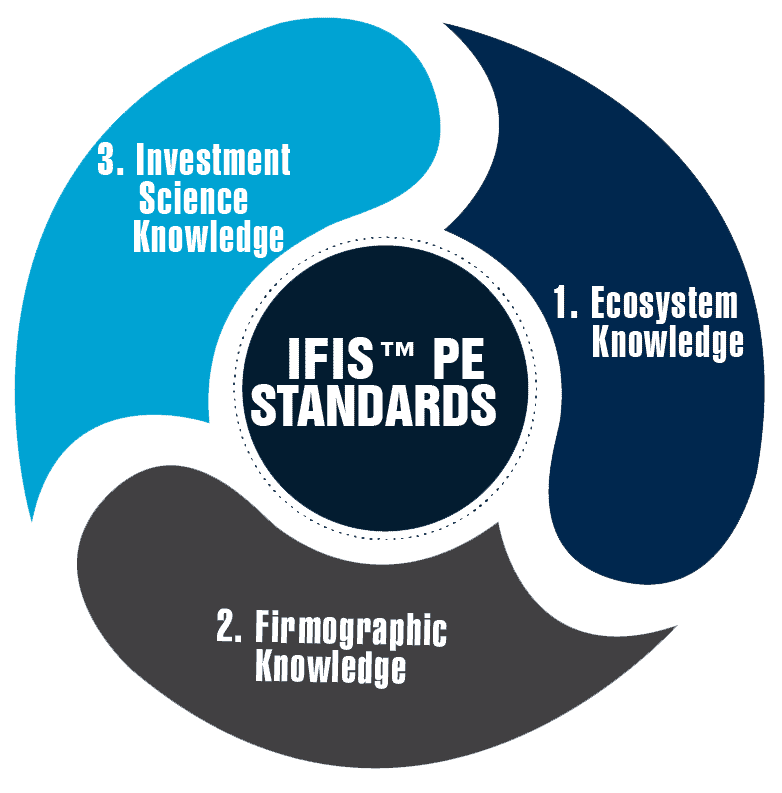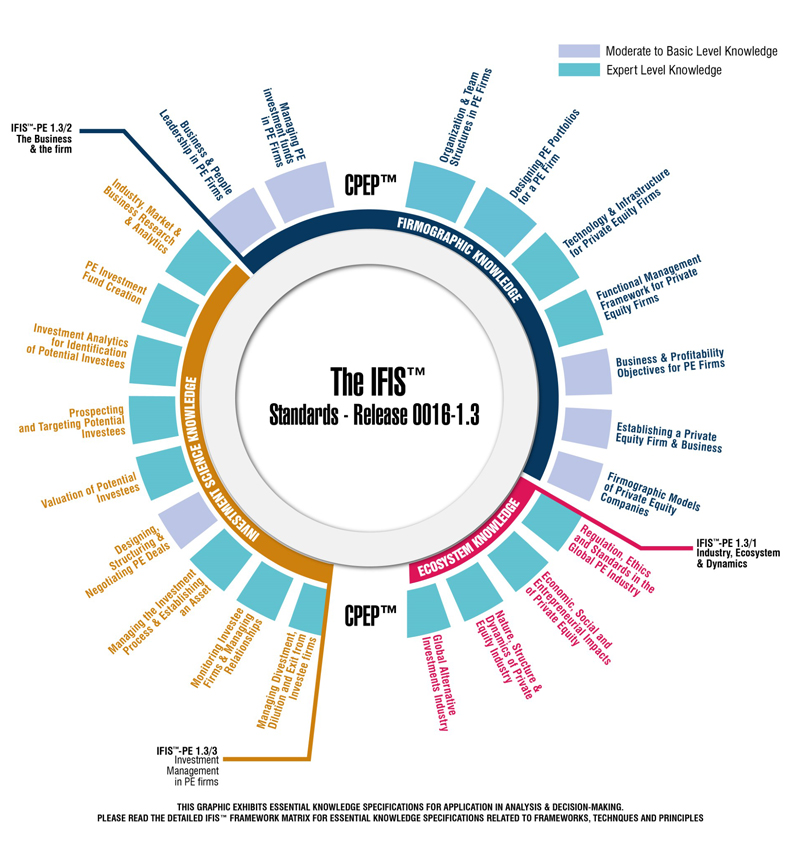| DM# |
Essential Knowledge Dimensions |
Application in Analysis & Decision-Making |
Frameworks & Techniques |
Concepts and Principles |
| A |
IFIS™-PE-1.3/1: INDUSTRY, ECOSYSTEM & DYNAMICS |
| MA-1 |
Global Alternative Investments Industry |
Expert Level |
Expert Level |
Expert Level |
| MA-2 |
Nature, Structure & Dynamics of Private Equity Industry |
Expert Level |
Expert Level |
Expert Level |
| MA-3 |
Economic, Social and Entrepreneurial Impacts of Private Equity |
Expert Level |
Expert Level |
Expert Level |
| MA-4 |
Regulation, Ethics and Standards in the Global PE Industry |
Expert Level |
Expert Level |
Expert Level |
| B |
IFIS™-PE-1.3/2: THE BUSINESS & THE FIRM |
| MB-1 |
Firmographic Models of Private Equity Companies |
Basic Understanding |
Moderate/ Functional Level |
Moderate/ Functional Level |
| MB-2 |
Establishing a Private Equity Firm & Business |
Basic Understanding |
Moderate/ Functional Level |
Moderate/ Functional Level |
| MB-3 |
Business & Profitability Objectives for PE Firms |
Basic Understanding |
Moderate/ Functional Level |
Moderate/ Functional Level |
| MB-4 |
Functional Management Framework for Private Equity Firms |
Moderate/ Functional Level |
Moderate/ Functional Level |
Expert Level |
| MB-5 |
Technology & Infrastructure for Private Equity Firms |
Moderate/ Functional Level |
Moderate/ Functional Level |
Expert Level |
| MB-6 |
Designing PE Portfolios for a PE Firm |
Moderate/ Functional Level |
Moderate/ Functional Level |
Expert Level |
| MB-7 |
Organization & Team Structures in PE Firms |
Moderate/ Functional Level |
Moderate/ Functional Level |
Expert Level |
| MB-8 |
Managing PE investment funds in PE Firms |
Basic Understanding |
Moderate/ Functional Level |
Moderate/ Functional Level |
| MB-9 |
Business & People Leadership in PE Firms |
Basic Understanding |
Moderate/ Functional Level |
Moderate/ Functional Level |
| C |
IFIS™-PE-1.3/3: INVESTMENT MANAGEMENT IN PE FIRMS |
| MC-1 |
Industry, Market & Business Research & Analytics |
Expert Level |
Expert Level |
Expert Level |
| MC-2 |
PE Investment Fund Creation |
Moderate/ Functional Level |
Moderate/ Functional Level |
Expert Level |
| MC-3 |
Investment Analytics for Identification of Potential Investees |
Expert Level |
Expert Level |
Expert Level |
| MC-4 |
Prospecting and Targeting Potential Investees |
Moderate/ Functional Level |
Moderate/ Functional Level |
Expert Level |
| MC-5 |
Valuation of Potential Investees |
Expert Level |
Expert Level |
Expert Level |
| MC-6 |
Designing, Structuring & Negotiating PE Deals |
Basic Understanding |
Moderate/ Functional Level |
Moderate/ Functional Level |
| MC-7 |
Managing the Investment Process & Establishing an Asset |
Basic Understanding |
Moderate/ Functional Level |
Expert Level |
| MC-8 |
Monitoring Investee Firms & Managing Relationships |
Basic Understanding |
Moderate/ Functional Level |
Expert Level |
| MC-9 |
Managing Divestment, Dilution and Exit from Investee firms |
Basic Understanding |
Moderate/ Functional Level |
Expert Level |



